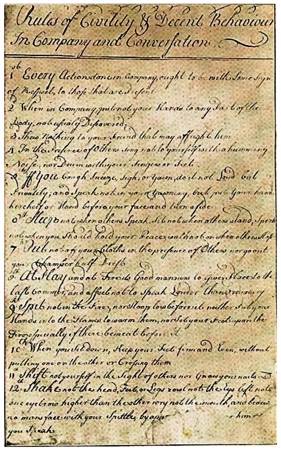Historians Make too Much of This Document

According to a legion of biographers and social commentators, the Rules of Civility, which George Washington transcribed as a schoolboy, contain the essence of the Father of Our Country, the code of conduct that allowed him to scale the slippery pole of success to its peak and remain there for two centuries.
Publishers love the Rules. There are only 110 of them, so they can be read during a medium-length ride on mass transit. Amazon offers at least 40 editions of the Rules, sometimes packaged with a few thousand words of contemporary blather to placate any purchaser who expected something meatier. A best-selling “novel of manners” recently pilfered the title and pretended to include the Rules as a theme.
At a time when courtesy and good manners are in short supply, the Rules are supposed to remind us of a time when leaders did not act like maladjusted schoolyard bullies.
Even better, the rules themselves are distinctly peculiar, even amusing. Some address ill conduct that few have contemplated (“Cleanse not your teeth with the table cloth, napkin, fork or knife”). Some are sensible enough (“When in company, put not your hands to any part of the body not usually discovered”).
And a few are arguable (“Do not laugh too loud or too much at any public spectacle,” or “In speaking to men of quality do not lean nor look them full in the face”).
Yet the fetishistic worship of The Rules of Civility founders on two facts routinely ignored: Washington did not compose them and there is zero evidence that he ever gave them a second thought after copying them out as a young teenager.
TheRules were 150 years old and out-of-date when young George encountered them. French Jesuits created them in the late 16th century. And although Washington’s was one of the best documented lives of the 18th century, he never mentioned the Rules a second time.
Washington’s papers now contain more than 30,000 writings by him or by secretaries writing at his direction. That’s more than 600 writings for every year after age 17. Not once in that avalanche of composition, however, did the Rules of Civility make it onto the page. Nor did anyone who knew Washington record that the great Virginian mentioned the Rules.
This yawning silence looms more significant because Washington was a man who liked to give advice. Indeed, giving advice becomes second nature when you are the celebrated leader of the country.
Though childless himself, Washington repeatedly offered helpful tips to his stepson, John Parke Custis, a young man who needed guidance more than most do. Then there were Washington’s four step-grandchildren, all proper targets of wisdom from the paterfamilias.
And pity his many nephews! Bushrod Washington, Lawrence Lewis, George Steptoe Washington, Lawrence Augustine Washington, Fielding Lewis, Samuel Washington, William Augustine Washington. . . . actually, he had had more than forty nieces and nephews, all fit recipients of Washingtonian counsel.
Yet not once did he suggest to any of them, or to anyone else, that they track down a copy of the Rules of Civility and modify their behavior accordingly.
The persistent mythical power of the Rules grows from two facts, one lamentable, one admirable. First, historians are suckers for anything written down. Because a piece of paper has survived and we can read it, the conclusion becomes overpowering that said piece of paper must be important. The fallacy of this reasoning is plain. Anyone who has cleaned out an attic or a desk drawer knows that lots of inconsequential stuff lasts for decades.
The second force behind the lasting impact of the Rules of Civility is that all contemporaries agreed that George Washington had excellent manners. Those manners must have come from somewhere, the reasoning goes, so why not from this weird etiquette manual composed by French clerics more than a century before he lived?
Here, the mothers of America should rise with savage fury to raise a point of personal privilege. What about George’s mother, Mary Ball Washington? George’s father is not a candidate as the source of George’s politesse. He was away on business for much of George’s early childhood, then died when George was eleven. So it had to be his mother.
This conclusion, however, runs squarely into another historical shibboleth: the prevailing historical view over the last seventy years has been that Mary Washington was an appalling cross between a virago and a termagant whose principal goal in life was to make her eldest son’s life a living hell.
The few accounts we have of Mary Washington depict her as a person of discipline, force, and ambition – actually, she sounds a good deal like her most famous son. Of course she was tough. She raised five small children as a single mother, managing a too-small farm after her husband left most of his good assets to two sons from his first marriage.
As near as we can tell, all of Mary Washington’s children had fine manners, even though four of them never seem to have read the Rules of Civility. It’s time to ditch those dusty old Rules and give some credit to the mom.